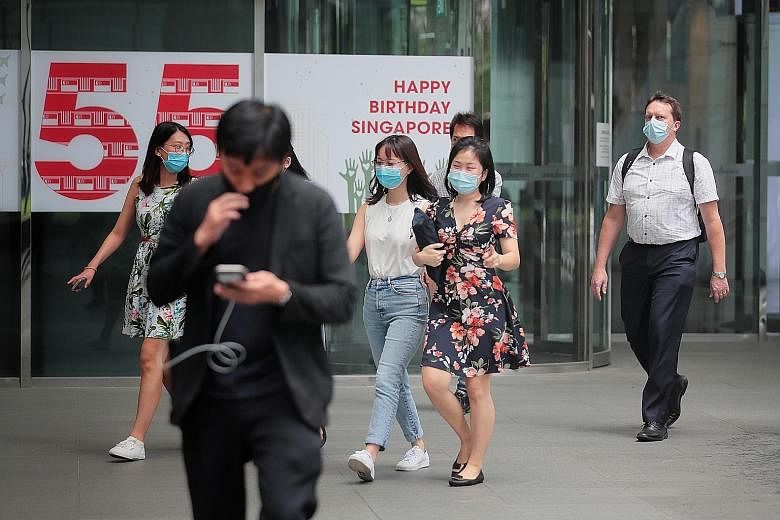The ultimate aim of attracting companies to Singapore and allowing them to hire foreigners is to create jobs and to improve the lives of citizens, said Prime Minister Lee Hsien Loong yesterday as he told Singaporeans that the Government is always on their side.
This openness has helped create more opportunities for Singaporeans, and even as Singapore adjusts its policies on work passes, it must be careful not to send the wrong signal that the country is no longer welcoming to others, he added.
Reiterating the promise made by several ministers who had spoken before him in the debate on the President's Address, PM Lee said: "The Government will always be on the side of Singaporeans.
"What is the point of creating jobs for foreigners if it does not benefit Singaporeans? Why would we want to do that? Ultimately, our aim is to grow our economy, create good jobs for Singaporeans and raise our standards of living."
Singapore has succeeded on this front in part by being an international hub and serving a global market, as well as by tapping foreign talent, he added.
His remarks followed two days of debate during which the House discussed the issue of the foreign workforce in Singapore, with many MPs calling for more protection for the Singaporean core in the workforce.
They shared stories from residents of having lost opportunities to foreigners and being outnumbered in their offices, and questioned whether the policies on work passes had perhaps been too lax.
PM Lee, speaking on the third day of the debate, acknowledged that Singaporeans are concerned about fairness and said that the Government takes it seriously.
He noted that the numbers of Employment Pass and S Pass holders have come down since the Covid-19 pandemic, and work pass schemes continue to be adjusted.
But he added: "There is no comfort in knowing that the total numbers are not too many, if personally, we feel that we have been discriminated against at the workplace, or that the Employment Pass holder working beside us somehow has an inside track."
He said that in considering whether or not to issue Employment and S passes, the Government looks at whether an employer has kept up its support of local professionals, managers, engineers and technicians.
For instance, when a company has an over-concentration of a single foreign nationality in its ranks, especially compared with other companies in the same sector, it suggests that the company has not really taken root in Singapore, he added.
"This concentration, if it is unchecked, can cause social resentment and workplace problems. It makes it harder for the company to blend into and be accepted by our multiracial society," he said.
"It can cause problems within the company too, because employees of other nationalities - Singaporean or others - may find it harder to fit in, take pride in their work and see a future for themselves in the firm."
Most companies have been responsive when asked to relook their hiring practices, he added, reminding firms to play their part in supporting Singaporean workers. In fact, he said, many global companies understand the advantages of having a diverse workforce and have explicit human resources policies to foster it.
Over the years, the Government had worked to attract such foreign companies to set up shop here and had allowed them to tap foreign talent when Singapore did not have workers with the skill sets needed.
But this was on the basis that the companies would also hire Singaporeans and help train them so that they can rise up the ranks and take on these jobs over time, PM Lee added.
He noted that local companies such as small and medium-sized enterprises sometimes also hire global talent who bring with them the expertise and knowledge needed to move up the value chain.
"And by doing so, they too create good, new jobs for Singaporeans besides promoting entrepreneurship and making it easier and more attractive to start companies in Singapore," he added.
While the economic benefits of Singapore's foreign worker policies were clear, there was a more fundamental question at the centre of the debate on foreign professionals and the Singaporean core, he said: "What sort of society, what sort of people do we want to be?"
Historically, Singapore as an open port and immigrant nation has always been open to the world and welcoming to others who can add value to society, he added.
"This generosity of spirit gives our society and economy vitality and resilience. It has made Singapore the exceptional, cosmopolitan city that we are today, plugged into the global economy and making a living by making ourselves valuable to the world ," he said.
"We may be under stress now, but we cannot afford to turn inwards. We will adjust our policies to safeguard Singaporean jobs, but let us show confidence that Singaporeans can hold our own in the world ."


